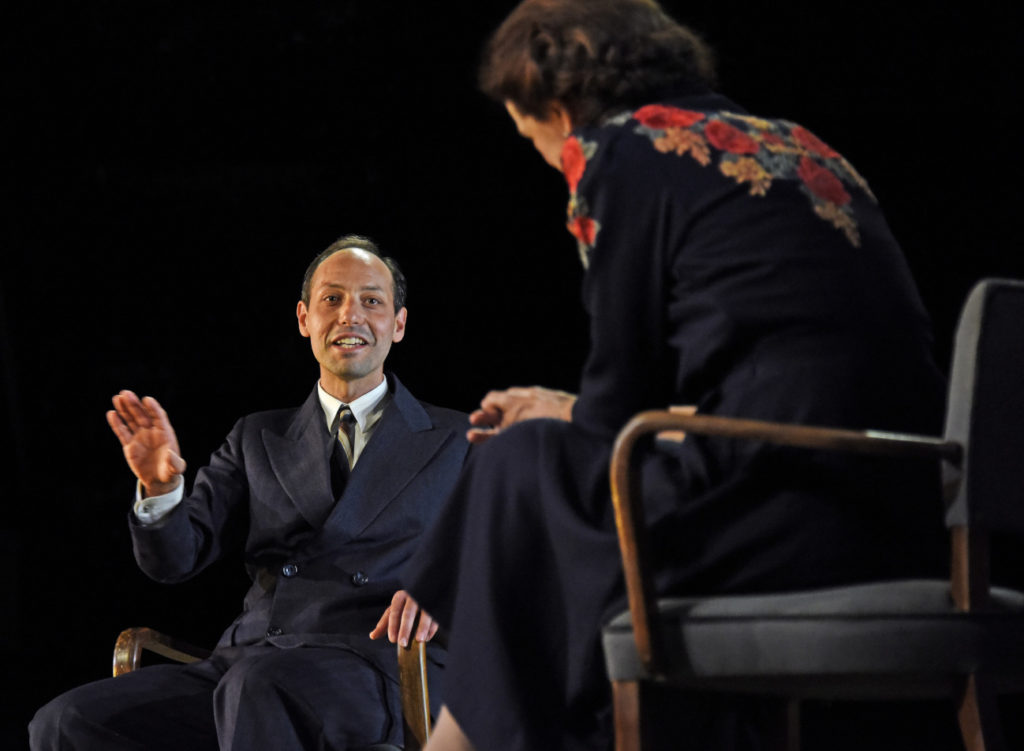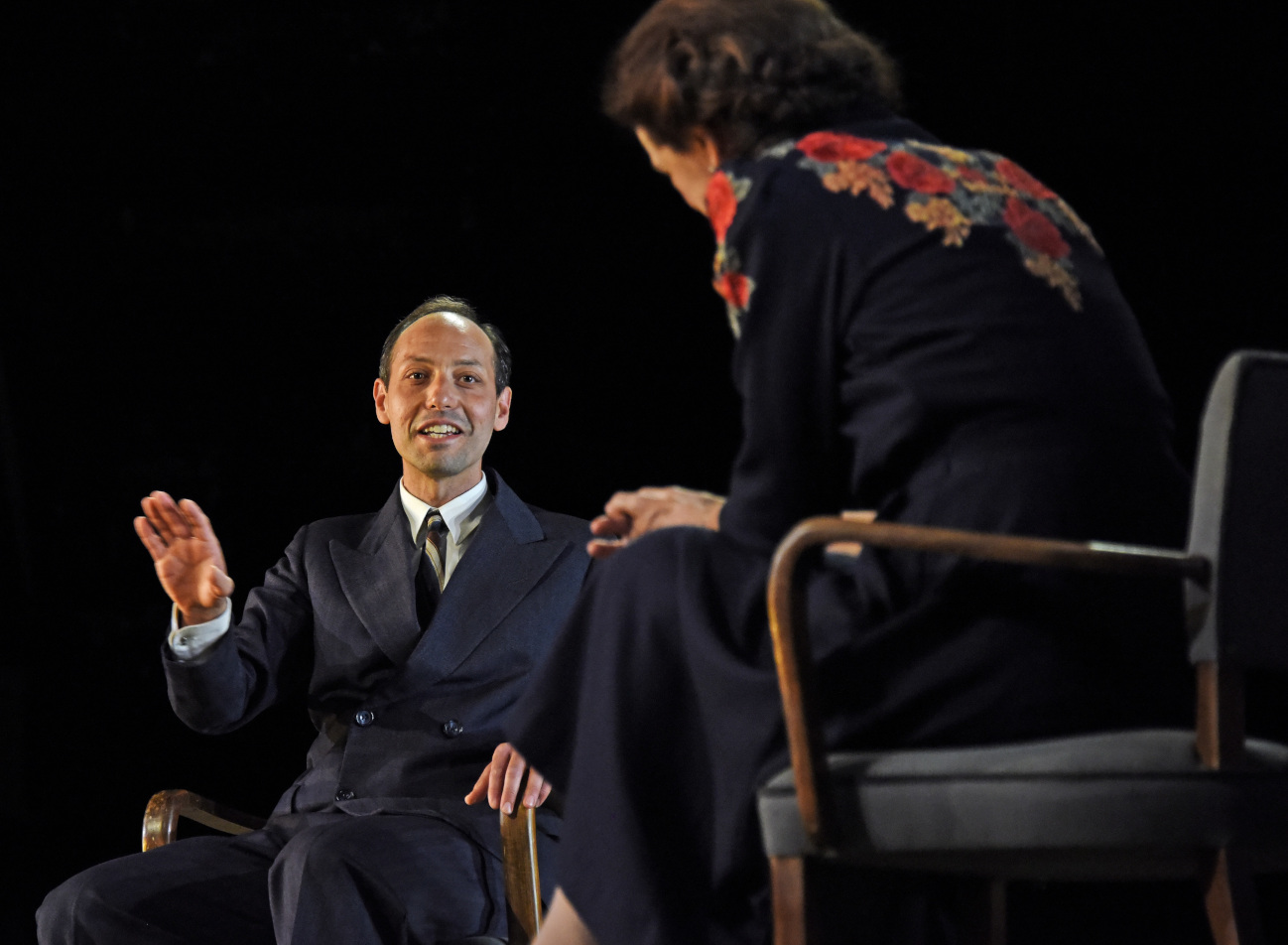
Bath’s Theatre Royal has marked the return of live theatre with two mind-stretching productions. Last month’s Four Quartets was magnificent, but there is no doubt that Eliot’s enigmatic poetry is not for the intellectually faint-hearted. Now we have Michael Frayn’s Copenhagen, directed by Emma Howlett, and again there is much to admire, coupled with a sense that one’s brain is being given a very thorough workout. At the heart of the play is a conversation that took place in Copenhagen in 1941 between two eminent physicists. Werner Heisenberg had travelled from Germany to Denmark to visit his old mentor and friend Niels Bohr. Heisenberg was a leading figure in Germany’s Uranverein, or ‘Uranium Club’; Bohr, whose mother was Jewish, had knowledge of the allies’ efforts to develop an atomic bomb. What did they talk about?
After the war, Heisenberg claimed that he had been on a moral mission to persuade Bohr to help him prevent either side from developing nuclear weapons. In stark contrast, Bohr recalled Heisenberg boasting of the progress the Germans had made. They never came to an agreement about what had occurred, and though he repeatedly attempted to clarify the issue, Heisenberg’s motives remain uncertain. Frayn has embraced that uncertainty, and as befits a play that delves into the strange world of sub-atomic physics, where Heisenberg’s ‘uncertainty principle’ sets strict limits upon what can be known, Copenhagen does not offer a straightforward, conventionally realistic depiction of that conversation. Instead, we see the spirits of Heisenberg, Bohr and Margrethe, Bohr’s wife, meeting in the afterlife in a final attempt to arrive at a definitive account of what was said. To do so, they revisit that conversation again and again, circling back each time to dig deeper and deeper into their memories. That structural circularity is echoed in Alex Eales’ sparse set, where a few chairs and a side table revolve to new positions each time a new exploration of their memories begins. Above them floats a large tilted circle of light; when it later becomes horizontal, it reminiscent of the head of a mushroom cloud.
Much of the play involves Heisenberg and Bohr debating arcane controversies relating to nuclear physics. Thankfully, they find ways to explain these complexities to Margrethe in relatively simple terms, and thus we begin to understand them too. But Margrethe serves as much more than just a device for presenting us with simplified physics. She is the moral centre of Copenhagen, firmly reminding Heisenberg that, though he may have been their friend, he was also a representative of a foreign regime that had ruthlessly occupied their country. Haydn Gwynne is totally convincing as a loyal wife who may be puzzled by quantum mechanics, but who has a firm understanding of human nature. She knows that issues of right and wrong are not best explained through mathematical equations.
Having lost a son in a boating tragedy, it is clear that Bohr had relished becoming a father figure to Heisenberg, his brilliant young protégé. Malcolm Sinclair vividly conveys Bohr’s initial warmth and geniality, but we also see his anger when faced with the cruel reality of their new situation. When Heisenberg suggests that there will be a time when they can again spend winter holidays together, Bohr sharply comments that perhaps Margrethe will sew a yellow star on his ski jacket.
As one of Hitler’s leading scientists, it would be tempting to see Heisenberg as the villain in this story. Tempting, Frayn shows us, but simplistic. In Philip Arditti’s magnetic performance we see that Heisenberg, full of nervous energy, embodies the moral dilemmas that can bedevil so-called ‘pure’ science. He is a patriotic German who can speak movingly of his homeland, but he is painfully aware that the Gestapo watch his every move: ‘I carry my surveillance like an infectious disease’. He is also aware that his research has presented him with an ‘impossible responsibility.’ If he tells his political masters that the creation of an atomic bomb is a possibility, they might give him the resources required. Will he then be responsible for the appalling destruction that will ensue? If he tells them that it is not possible, is he a traitor? What if the allies succeed, and use such a weapon against Germany? Copenhagen reminds us that Robert Oppenheimer had thought of Germany as the original target for his bomb; it was by chance that Germany was defeated before the Manhattan Project came to fruition. Copenhagen is full of such intriguing twists and turns, puzzles and paradoxes. For example, Heisenberg’s reputation was forever stained by his association with Nazi Germany, though his work never led to a single death. In contrast, Bohr’s reputation is unblemished, yet he contributed to the building of the bombs that devasted Hiroshima and Nagasaki. Our politicians are currently making very serious decisions based upon scientific data; are the politicians wholly responsible for the consequences of those decisions, or is that responsibility to be shared by the scientists?
At times Copenhagen is perhaps a little too pedagogic, and in the early stages of the play some expository passages are heavy-going. It is also, perhaps, a fraction too long. But it is an immensely absorbing play, and in this well-directed and superbly performed production, it is not to be missed. ★★★★☆ Mike Whitton 16th June 2021


